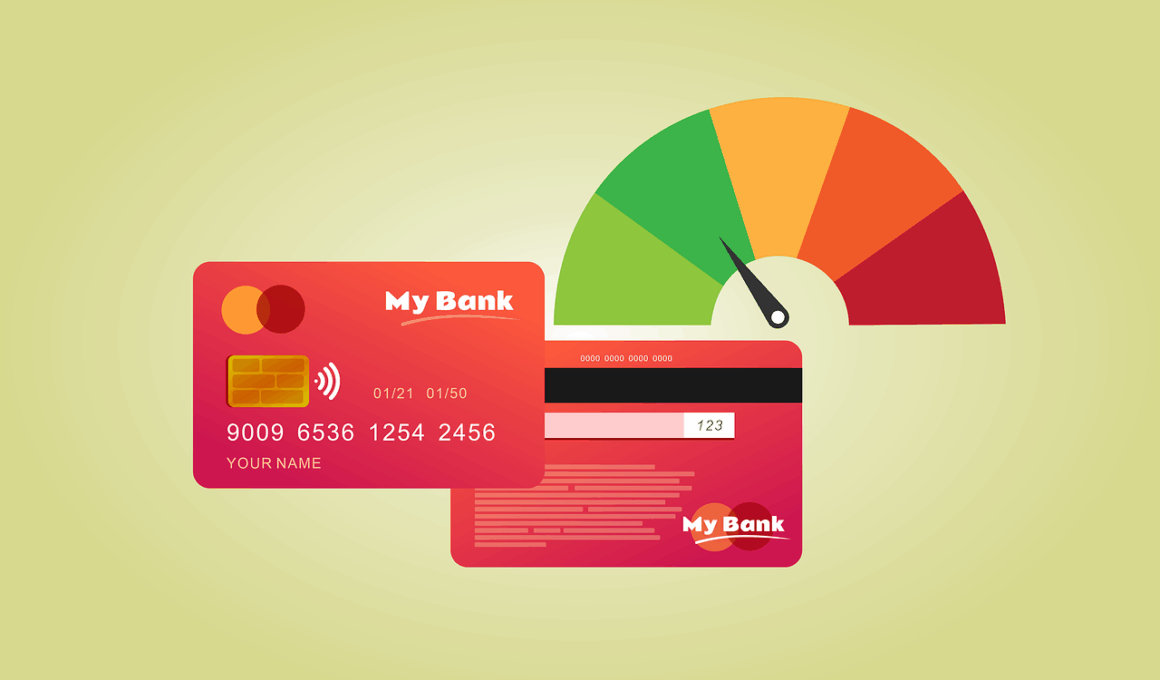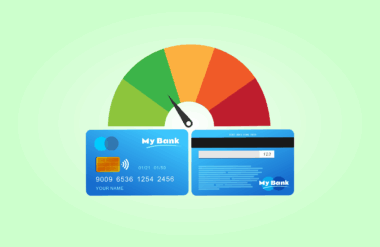The Impact of Credit Card Usage on Your Credit Score
Credit cards provide flexibility and convenience, but they can significantly affect your credit score if not managed properly. Understanding this impact is essential for maintaining your financial health. Your credit utilization ratio, which compares your credit card balances to your credit limits, is vital. Generally, it’s best to keep this ratio below 30%. Exceeding it can lower your score substantially. Late payments also contribute negatively; they stay on your credit report for up to seven years. Such payments can severely damage your creditworthiness and hinder future loan opportunities. Additionally, applying for multiple credit cards in a short time can lead to hard inquiries, which may reduce your score temporarily. Therefore, timing your applications can be beneficial for your overall credit profile. Moreover, maintaining older credit accounts demonstrates credit history, which helps improve your score. Closing old accounts can negatively impact the length of your credit history. Regularly monitoring your credit report can identify errors and help you understand your credit score’s makeup. Being informed allows you to take action and manage your score effectively over time.
Your payment history holds great importance, accounting for about 35% of your credit score. This means making payments on time is the most critical factor in determining your score. Credit scoring models reward consistent, timely payments. Consider setting up automatic payments to avoid late fees. Another essential aspect is the total amount owed, which contributes approximately 30% to your score. Aim to reduce your credit card balances. Lowering these amounts significantly impacts your credit utilization ratio positively. If you’re carrying balances, consider consolidating them into a single loan with a lower interest rate; this approach can simplify management and enhance your credit score over time. Using credit responsibly is crucial. After receiving your statement, pay off your balance in full whenever possible. Consistent, on-time payments while keeping utilization low can lead to significant improvements in your credit score, expanding your financial opportunities. Additionally, avoid maxing out your card; doing so can send a negative signal. Always consider your spending habits and develop a budget that aligns with your income to maintain healthy credit card usage.
Understanding Credit Utilization
Credit utilization reflects how much credit you are using compared to how much you have available. It strongly influences your credit score, so understanding it is essential for effective credit management. Experts recommend keeping your utilization ratio below 30%, which means you should only use a third of your available credit limit. If you find yourself frequently exceeding this ratio, it might be time to reassess your spending habits. Look for ways to reduce monthly expenses or increase your income, allowing you to pay down debts faster, thereby improving your credit utilization. If you’re approaching the 30% threshold, try to make an extra payment before your billing cycle ends. This can help lower your balance, ultimately enhancing your score. Also, consider requesting a credit limit increase from your card issuer. A higher limit, without increasing your spending, will help lower your utilization rate significantly. However, do this judiciously. Remember, applying for more credit could lead to hard inquiries, which may temporarily hurt your credit score.
Credit card rewards and benefits can play a dual role in enhancing your financial life while also impacting your credit score. Choosing the right credit card is crucial, as some offer specific bonuses that can produce great rewards but must be managed wisely. Utilize cards that have perks such as cash back, travel points, or lower interest rates, but be cautious not to overspend simply to earn rewards. Always remember that the primary focus should be on paying off your balance in full each month to avoid accruing interest on your purchases. However, cashback rewards can be impactful when used responsibly; earning a percentage back on every purchase is beneficial, provided you don’t carry a balance. Similarly, interest-free offers on purchases can provide breathing space for necessary expenses, but be disciplined about paying them off timely. Failing to do so could lead to more significant debt, which ultimately costs you more in the long run. Balancing reward aspirations with sound financial habits is essential for long-term credit management success.
The Importance of Credit History
Your credit history is a critical factor in evaluating your creditworthiness. Lenders often consider how long each account has been active, which affects your credit score. A longer credit history can benefit your score, demonstrating reliability over time. Regular, responsible use of credit helps build a positive history. Managing multiple credit accounts responsibly can also show lenders you can handle debt effectively. However, beware of closing old accounts, as this can shorten your credit history and negatively impact your score. Even if you no longer use an old credit card, keeping it open can contribute positively to your credit history. Ensuring you maintain a diverse mix of credit, like auto loans, student loans, and credit cards, can enhance your overall score. It’s essential to manage these responsibly. Furthermore, monitoring your accounts helps ensure there are no inaccuracies affecting your credit score. Checking your credit report regularly is key to identifying discrepancies or fraud. Understanding the significance of your credit history allows you to take proactive steps to foster a positive credit profile.
Regularly reviewing your credit report is crucial for effective credit management. Understanding your score and checking for inaccuracies can significantly impact your financial decisions. Request your free credit report annually to stay informed. Examine it closely for discrepancies, such as incorrect balances or accounts you haven’t opened. Reporting errors promptly protects your credit score from unnecessary damage. Additionally, understanding how various factors affect your score can empower you; knowing that your payment history accounts for a large percentage of your score can motivate timely payment behavior. Furthermore, financial education resources can assist in understanding credit reports. Numerous organizations offer online courses, workshops, and information on credit management. Taking advantage of these resources helps improve financial literacy, leading to better credit decisions. When implementing this knowledge, remember that building good credit takes time. Avoid negative behaviors, and focus on positive practices like timely payments and low balances. Ultimately, maintaining a healthy credit score opens opportunities for loans, lower interest rates, and financial security. A strong credit profile is not just for the present; it’s also an investment in your future financial health.
Final Thoughts on Credit Card Management
Managing credit cards effectively is vital for maintaining a solid credit score. As discussed, a significant amount of your score is dependent on payment history and credit utilization rates. Additionally, understanding the implications of credit inquiries and maintaining an appropriate credit mix contributes to this score. Make informed choices when it comes to applying for new cards or loans. Determine whether you genuinely need another credit card, and if so, research different options to find a balance that suits your financial situation. After securing a new account, prioritize responsible use by paying down balances swiftly. Never lose sight of your credit goals; setting reminders for payments and budgeting can help maintain a healthy credit profile. Moreover, remaining proactive about financial education enables you to adapt to evolving credit environments. Achieving and maintaining a good credit score requires commitment, patience, and responsibility. In the end, your credit score reflects your financial behavior and can lead to better rates for loans, mortgages, and even insurance premiums. Therefore, invest time into understanding and managing your credit card use.
Ultimately, credit cards should serve as a tool for your financial success rather than a source of stress. Adopting healthy credit habits is essential for creating stability and long-term growth in your financial life. Educate yourself on the credit system to avoid common pitfalls, and always seek to clarify information you don’t understand. Transparency with your credit card practices is fundamental. Regular communication with card issuers can clarify payment options, interest rates, and rewards programs. This relationship can provide insights into how to maximize your advantages while managing your responsibilities. Moreover, fostering good credit habits lays a foundation for future financial endeavors. Whether it’s financing a large purchase, acquiring a vehicle, or planning a home, a strong credit score is a prerequisite. Establishing this will take commitment but is rewarding over time. Being mindful of spending habits and credit card usage creates a balance that contributes to financial health, paving the way for opportunities like favorable financing. Make a commitment now to manage your credit responsibly and embrace the benefits of a sound financial future.





